SAMARITAN STRATEGY PROJECT IN KAYOLE-SOWETO, KENYA
Establishing self-sustaining Samaritan Strategy teams in new areas
Elly Oliveira, Global Field Coordinator
Half of adult women in Sub-Saharan Africa cannot read and write. The literacy challenge is gendered and God has touched His church, His primary agent to bring His Kingdom on earth, to do something about this problem at a community level. The approach of biblical wholism to women literacy was a topic at the Samaritan Strategy project in Kayole Soweto. Harvest Associate Meshack Okumu coordinated this project and below is his fantastic story. We invite you to read it and praise God with us for the final outcome.
The “Samaritan Strategy” (SamS) program helps churches demonstrate God’s intentions in every area of life. It uses step-by-step applications called “disciplines of love” and “seed projects” to disciple people in practical ways, following the biblical model of Jesus’ growth. A SamS project has four phases: (1) network, (2) training, (3) coaching, and (4) commissioning.
THANK YOU
We thank the Harvest team and the participants in the SamS project in Kayole-Soweto, Kenya. Their vision and dedicated services blessed many people. We thank the donors who so generously contributed to this project. We would not be able to do it without their help. We praise the Lord for His provision, guidance, and protection, and pray that SamS projects may be multiplied for His glory.
ILLUSTRATION OF HARVEST’S MINISTRY FROM ONE OF OUR FIELDS – KENYA
Meshack Okumu, Harvest Associate, [email protected]
NETWORK
Contact (July 3, 2017)
I was talking on the phone with Bishop Mike, who I have known for a long time, when he inquired if I could train some of the pastors in Kayole-Soweto, where he works. I said “yes” and shared about the SamS program. I traveled to Kayole Soweto, we met and agreed to start once he mobilized a team for the training.
Visit (August 22, 2017)
Abraham is one of the pastors who I have mentored and now trains with me. He traveled with me to Kayole Soweto and met with the sixteen pastors who Bishop Mike brought together. We had a vision casting meeting using Harvest materials and highlighting the mission of Christ, therefore the mission of the church.
An overview of Kayole Soweto
The Kayole Soweto slum traces its origin to 1976, when President Jomo Kenyatta ordered to relocate the people from Embakasi (where current military barracks stand near Jomo Kenyatta International Airport). The Nairobi City Council and military surveyors planned the settlement with social spaces like a market, a school, and a hospital before the dwellers were brought in between 1978-79. In 1981, people from Kwa Gitau moved to Soweto after an influential politician grabbed their land. Currently, with a population of about 12,000, the adult-children ratio is 4:7.
Housing
There are over 8,000 house structures with an average of two rooms of ten by ten feet. Common building materials are timber and iron sheets with cement floor. There are few stone houses, mainly occupied by the structure-owners.
Infra-structure
Piped water is available in more than thirty-five standpoints managed by the water meter-owners, who sell a 20-litre container at US$0.050-US$0.10. The settlement lacks sewer line connection, but there are over 200 pit latrines built and maintained by the structure-owners, and public latrines, which cost US$0.10 per use. The open drainage channels are maintained by the residents, but prone to blockage by solid waste when it rains and they commonly flood. There is external road access, but the encroachment of structures has restricted internal pathways. The village’s designated social spaces have been converted into residential use.
Economic activities
Earning up to US$3 per day, most residents engage in casual unskilled and semi-skilled jobs, or self-employment in small-scale enterprises. A few are in formal employment, and unemployment and crime are major concerns in the area.
TRAINING
Basic training (September 25-29, 2017)
My experience in informal settlements is that it is difficult for people to attend a five-day training. But this time, most of those who began on Monday finished on Friday. This was a wonderful training. The sessions started each day with a devotion followed by a review from the previous day. The ministers were amazed by the simplicity, the truth, and the impact that the teachings had in their personal lives. Since we were in a time of presidential elections, most participants confessed that they did not love enough and vowed to work for peace with their neighbors of different political views. They began to serve one another during the training, which was much encouraging to us, facilitators.
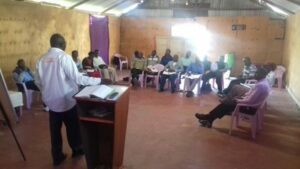
November 25, 2017
The last two months were used to plan and do seed ministries (we use the term “seed ministries” instead of “seed projects” to avoid a misunderstanding that this would be a project for funding). I was in contact with the participants through phone calls and Whatsapp messages. The presidential election left so many people wounded as different people from the political divide misunderstood each other. There was a lot of animosity between the public and the police force. With that in mind, we organized a seed ministry to reach out to the police in our town.
Advanced training (January 22 – 26, 2018)
The break since our last session gave the participants the opportunity to implement seed ministries. There was a lot of excitement while they shared what they did. A total of ten seed ministries and twenty-five disciplines of love were carried out, and some examples are below.
A lady called Faith went to Rombo at the Kenya–Tanzania boarder and organized a meeting among the Maasai, where four men and sixteen women were present. They discussed issues affecting women, especially the literacy challenge, which made her begin an adult education center. Five Maasai women enrolled and were learning how to read and write.
Other ministries were visiting the sick, reconciling a man (who was living on the street) with his family, buying food and clothes for street people, giving food to a hungry neighbor, and buying Christmas gifts worth a month’s collections in a church, then distributing them to the police force.
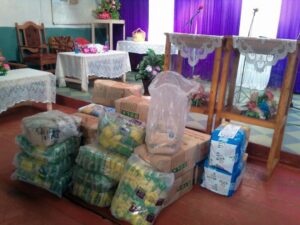
COACHING
Training of Trainers, TOT (March 19 – 23, 2018)
A total of twenty-four people attended the training. Each student facilitated a topic or a section of one of Harvest lessons and the other students made comments about their presentation. This went on very well, even though there was a need to practice more. Each of them was tasked to form a discipleship group and in so doing learn and improve their facilitation skills.
The participants continued to implement seed ministries moving forward with their calling to serve. There was excitement among them while they became more aware of their surroundings. Many spoke how they learned to be “good neighbors” to those around them. A total of five seed ministries and fifteen disciplines of love were reported, and some examples are below.
A man went to a bar, bought a non-alcoholic drink, shared it with a young man and spent some time talking to him. Through their talk, the young man confessed his intention to commit a crime, changed his mind and promised not to do it.
Two participants helped a father in need to pay the school fees for his daughter.
A person shared his food with a needy neighbor.
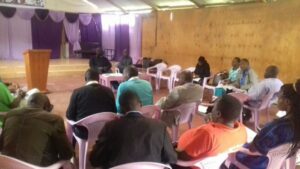
April 20, 2018
The Lord’s faithfulness accompanied us during this training. The participants reported about the use of Harvest materials in discipleship and Bible study groups in their local churches.
Apparently, Faith was called during the TOT and informed that the girls in the education center were relocated to the parish of a Catholic Church. When she got back to Rombo, she went to the police station and gave an account of the girls. She was charged with kidnapping and put in prison with a bail close to US$ 10,500. She was under police custody for approximately a month before her family raised the amount required and released her. While in jail, she met a highway robber. When she left the cell, the robber had given her life to the Lord.
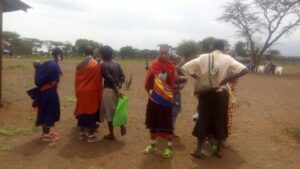
May 20, 2018
The pastors continued to implement what they learned in the training. I had a one-day meeting with sixteen pastors where they shared about their progress. Some used the materials to preach, while others were discipling people, and some were implementing seed ministries and disciplines of love. My encouragement to the pastors was always about the need to disciple people and thereby multiply themselves.
Mentorship (June 12, 2018)
The pastors shared about what God did through their various ministries. They were more open to see opportunities for “service” as opposed to confining their work to “Sunday service”. Service became part of the life of their churches. For example, a church member fell sick and when the members went to visit her, they were asked to donate blood because she needed a transfusion. On the hospital bed next to her was a lady who had been abandoned by her relatives and was suffering from cancer. She also needed a transfusion, but since no one visited her since she was admitted three months before, she could not receive treatment. At hearing about her plight, church members organized themselves and donated the blood, which saved her life.
The members of another church thought that they were under-utilizing their building, and this led them to turn the place into a center where children could be instructed during the holidays. The children from the community and from the church came and were taught. Through this interaction, the community began to accept the church. While church members came to know the children, they noted that some were struggling to pay school fees. So, the church was looking for ways to help them. The church also donated clothes to the kids. One of the things introduced in the church after the training was fasting. Every first Sunday of the month the members of the church held a fast. The proceeds out of the fasting were brought to the church and they identified a needy person in the community to receive the support. Through this, the church paid half of the house rent of a needy person in their community and they were looking for funds to help the same family start a small business.
After going through the SamS training, Susan started to reach out to her community and, at the same time, became more involved in her local church. She began visiting the sick, sharing her little resources with those in need, teaching people how to begin a small business, and every Monday conducting a fellowship in her house with ten people. She joined a hospitality church group called “Mercy Ministry”, collecting food and distributed to those in need, like widows, orphans, and the sick. She witnessed to some people and they gave their lives to the Lord. Susan said that she could evangelize and bring people to Christ thanks to the SamS training. That is how she learned to share the Gospel.
The pastors and leaders have used Harvest materials to disciple people so that all church members are on board with the teaching. I could say that the church was learning to be wholistic in her approach to ministry.
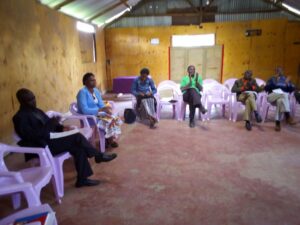
MULTIPLICATION
Observation (July 16, 2018)
The pastors continued to use SamS materials in Bible studies and home fellowships, helping their whole churches be on board about their wholistic mission and its important role in the transformation of their societies. They shared some of the successes and the joy of using Harvest materials in their trainings. The involvement of church members in Bible studies was an added bonus, allowing them to discover and respond to challenges around them. Ten seed ministries and fifteen disciplines of love were done since our last session, and some examples are below.
A pastor’s neighbor was bereaved, so the pastor and his church helped his family.
A group allowed people from the Seventh Day Adventist Church to use their church building every Saturday. Even though there were ill talks about the Sunday worshippers, they did not regret giving their building for worship.
A pastor paid transportation for a lady in crutches who came to his church. The pastor saw her as a needy person and helped. What he did not know was that she actually could afford the cost of transportation. The following Sunday she came back to the church and blessed the pastor with enough money to pay for his house rent.
A church leader was used by God in her gated community, which was very conservative. She wanted to begin some ministry there, but it was difficult because everyone minded their own business. The Lord gave her the idea to buy first-aid kits and whenever there was an injury, like when children played football, she would clean their wounds. Through this, she established a good rapport with the people. Afterwards, every Sunday in church a poor lady would come and ask for her help. The training gave the lady an idea. She told the poor lady to look for 100 Kenyan shillings –slightly above one dollar–, buy used clothes, iron and sell them in her neighborhood. She did it, then started a clientele, and the business was doing well.
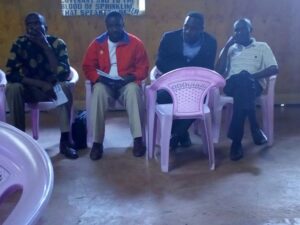
Commissioning (September 18, 2018)
The one year that Abraham and I were involved in the SamS project in Kayole Soweto was very helpful. We saw the pastors begin the process of transformation by practicing and teaching Kingdom values. At the end of the project, I was wondering what opportunities were there to multiply the SamS training. It was my prayer that this experience could be shared and replicated in other informal settlements of Nairobi.
The commissioning took place on a Wednesday with twenty-two people in attendance, sixteen of them commissioned as trainers. A pastor shared how through this training he was able to plant a church. Another shared how a fellowship he started with just five people grew to seventeen. Another shared how he used the disciplines of love to demonstrate the love of Christ with people in need. At that time, he was putting up a class in a town 124 miles away from Nairobi.
Faith, who started the literacy program for women, came from a Muslim background and knew the church to be spiritual but not loving. At the SamS training she learned about love. I talked to her recently, she went to court on October 10th, when a lady was supposed to bring the girls to give their testimony on how Faith “kidnapped” them. To her surprise, neither the girls nor the investigating officers appeared. The Lord was fighting her battles and there is likelihood that she might be acquitted for lack of evidence.
God did amazing things during the SamS project in Kayole Soweto and I am grateful that He used humble people to make His praises known among the nations.

Praise the Lord for a great impact. Coram Deo